Programme
Jean Sibelius
Violin Concerto in D minor, Op. 47 (31')
— Intermission —
Detlev Glanert
Prague Symphony. Lyric Fragments after Franz Kafka (Symphony No. 4) (world premiere) (45')
Secure your seat for the 2025/2026 season – presales are open.
Choose SubscriptionFor the first programme of Series C, chief conductor Semyon Bychkov has invited the youthful Swedish violinist Johan Dalene, whose appearance at the Rudolfinum will be his Prague debut and first collaboration with the Czech Philharmonic. The Prague Symphony by the German composer Detlev Glanert will receive its world premiere.
Subscription series C | Duration of the programme 1 hour 35 minutes
Jean Sibelius
Violin Concerto in D minor, Op. 47 (31')
— Intermission —
Detlev Glanert
Prague Symphony. Lyric Fragments after Franz Kafka (Symphony No. 4) (world premiere) (45')
Johan Dalene violin
Catriona Morison mezzo-soprano
Christian Immler bass-baritone
Semyon Bychkov conductor
Czech Philharmonic
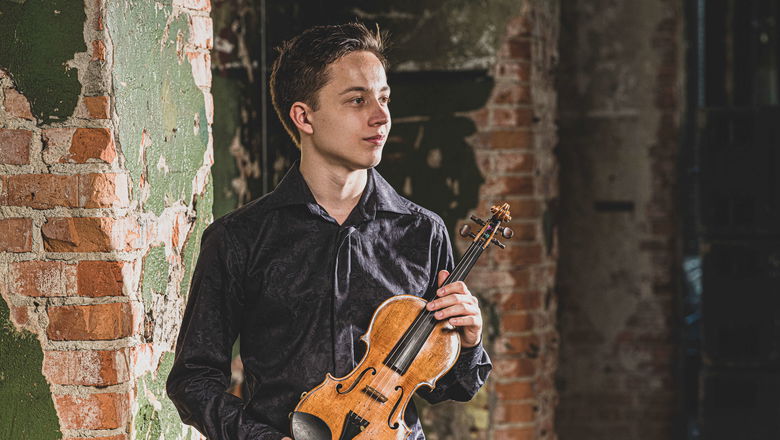
The Prague Symphony was commissioned by the Czech Philharmonic through Semyon Bychkov and its performance will be a great event.It had been planned for March 2021, but that was not possible, so the work was first heard elsewhere. It was commissioned by Semyon Bychkov and the Czech Philharmonic, and the performance will be a major event. Maestro Bychkov is equally excited about the soloist for the Sibelius concerto: “I think the evening’s soloist Johan Dalene is an exceptionally talented violinist, and I am greatly looking forward to his performance of Sibelius’s Violin Concerto.”
Johan Dalene violin
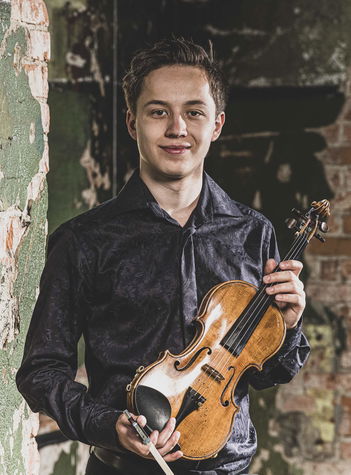
22-year-old Swedish-Norwegian violinist Johan Dalene is already making an impact on the international scene, performing with leading orchestras and in celebrated recital halls both at home and abroad. His ability to “make his Stradivarius sing like a master” (Le Monde), coupled with his refreshingly honest musicality and engagement with musicians and audiences alike, has won him countless admirers. This talent was heralded most recently as winner of the Norwegian Soloist Prize and First Prize at the prestigious 2019 Carl Nielsen Competition, which was broadcast to audiences worldwide. In October 2022 he was awarded the “Young Artist of the Year” prize by Gramophone.
Johan’s recent and forthcoming orchestral highlights include his debut at the BBC Proms with the BBC Symphony with Jordan de Souza, debut performances with the Leipzig Gewandhaus Orchestra with Sakari Oramo, Czech Philharmonic with Semyon Bychkov, San Francisco Symphony with Esa-Pekka Salonen, London Philharmonic Orchestra with Karina Canellakis and many more.
Johan is equally passionate about chamber music and will be giving a series of recitals in the USA for the first time in Spring 2023, notably at New York’s Carnegie Hall and San Francisco’s Davies Symphony Hall. Other chamber highlights include a new collaboration with Igor Levit and Julia Hagen, for performances at London’s Wigmore Hall and the Heidelberg Festival. Recently selected as a European Concert Hall Organisation (ECHO) Rising Star, he performed recitals in some of Europe’s most prestigious concert halls, while also engaging in Education, Learning and Participation work with diverse communities in cities across the ECHO network.
Recording exclusively for BIS, Johan released his third album on the label in March 2022 – it features the Nielsen and Sibelius Concerti, with the Royal Stockholm Philharmonic with John Storgards, and garnered Johan his third coveted “Editor’s Choice” from Gramophone Magazine. His second disc of Nordic recital music (released in Spring 2021) received a prestigious Diapason D’Or.
Johan began playing the violin at the age of four and made his professional concerto debut three years later. In Summer 2016, he was student-in-residence at Switzerland’s Verbier Festival and in 2018 was accepted on to the Norwegian Crescendo programme, where he worked closely with mentors Janine Jansen, Leif Ove Andsnes and Gidon Kremer. Today he studies with Per Enoksson, Professor at the Royal College of Music in Stockholm, as well as with Janine Jansen, and has also participated in masterclasses with a number of distinguished teachers, including Dora Schwarzberg, Pamela Frank, Gerhard Schulz, and Henning Kraggerud. He has been awarded various scholarships and prizes, notably from the Royal Swedish Academy of Music, The Anders Wall Giresta Scholarship, Queen Ingrid’s Honorary Scholarship and many others.
He plays a Stradivarius violin from 1736, generously on loan from the Anders Sveaas’ Charitable Foundation.
Catriona Morison mezzo-soprano
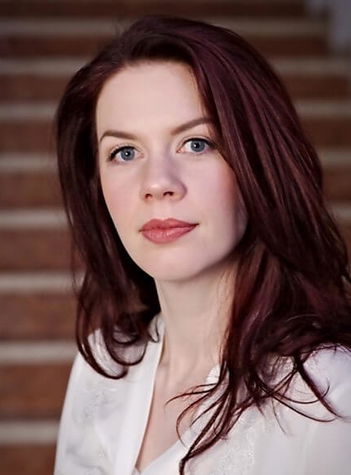
After having graduated from music school in Glasgow (Royal Conservatoire of Scotland), Berlin, and Weimar, the career of the Scottish mezzo-soprano Catriona Morison has been on the ascent step by step. She was a member of the opera studio in Weimar, then she won an engagement at the opera in Wuppertal, but the breakthrough of her career came in 2017 (at age 31), when she was the winner at the famed competition BBC Cardiff Singer of the World. Since then, we have been seeing her routinely on concert stages with famed orchestras such as the Cologne Philharmonic, the Orchestra of the Leipzig Gewandhaus, and the Elbephilharmonie and at the festivals in Edinburgh and Salzburg. She has also appeared at the BBC Proms. She has not forgotten about Wuppertal, however, where she recently sang the role of Nerone (The Coronation of Poppaea).
Her repertoire knows no limits, encompassing works from four centuries including contemporary music. For example, she gave the world premieres of This Frame is Part of the Painting by Errollyn Wallen and of the Prague Symphony by Detlev Glanert, with which she made her Czech Philharmonic debut two years ago. Last season, she stood in at the last moment for the ailing Christa Mayer in Mahler’s Third Symphony.
Christian Immler bass baritone
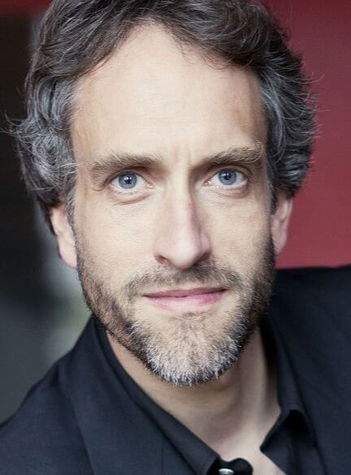
Having grown from a choirboy in the Tölzer Knabenchor into a star bass-baritone who travels to the top concert halls around the world, Christian Immler is known to us mainly as an interpreter of baroque and early classical works, but his repertoire is gradually expanding to include the recital and orchestra tradition of the 19th century and onwards to the works of contemporary composers. He is not neglecting opera productions either.
Besides his vocal studies at London’s Guildhall School of Music (Rudolf Piernay), he also studied musicology. His international career began with victory at the Nadia and Lili Boulanger Competition in Paris, which opened him the door to the world’s top orchestras (BBC Symphony Orchestra, Orchestra of the Leipzig Gewandhaus, Concertgebouw Orchestra in Amsterdam) and famed concert halls. He mainly visits those halls with his piano partner of many years, Helmut Deutsch (their joint CD won the prestigious Diapason découverte).
In 2022 he thrilled the Prague public as Pilate in the St John Passion, and soon afterwards he made his successful debut with the Czech Philharmonic in the Prague Symphony by Detlev Glanert.
Semyon Bychkov conductor
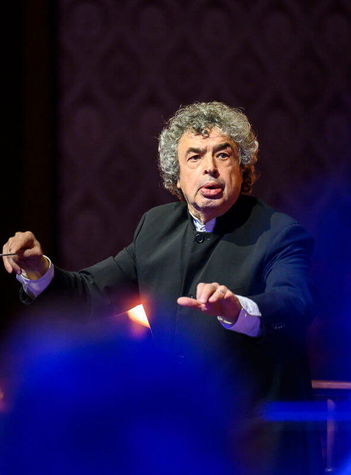
In addition to conducting at Prague’s Rudolfinum, Semyon Bychkov and the Czech Philharmonic in the 2023/2024 season, took the all Dvořák programmes to Korea and across Japan with three concerts at Tokyo’s famed Suntory Hall. In spring, an extensive European tour took the programmes to Spain, Austria, Germany, Belgium, and France and, at the end of year 2024, the Year of Czech Music culminated with three concerts at Carnegie Hall in New York.
Among the significant joint achievements of Semyon Bychkov and the Czech Philharmonic is the release of a 7-CD box set devoted to Tchaikovsky’s symphonic repertoire and a series of international residencies. In 2024, Semjon Byčkov with the Czech Philharmonic concentrated on recording Czech music – a CD was released with Bedřich Smetanaʼs My Homeland and Antonín Dvořákʼs last three symphonies and ouvertures.
Bychkovʼs repertoire spans four centuries. His highly anticipated performances are a unique combination of innate musicality and rigorous Russian pedagogy. In addition to guest engagements with the world’s major orchestras and opera houses, Bychkov holds honorary titles with the BBC Symphony Orchestra – with whom he appears annually at the BBC Proms – and the Royal Academy of Music, who awarded him an Honorary Doctorate in July 2022. Bychkov was named “Conductor of the Year” by the International Opera Awards in 2015 and, by Musical America in 2022.
Bychkov began recording in 1986 and released discs with the Berlin Philharmonic, Bavarian Radio, Royal Concertgebouw, Philharmonia Orchestra and London Philharmonic for Philips. Subsequently a series of benchmark recordings with WDR Symphony Orchestra Cologne featured Brahms, Mahler, Rachmaninov, Shostakovich, Strauss, Verdi, Glanert and Höller. Bychkov’s 1993 recording of Tchaikovsky’s Eugene Onegin with the Orchestre de Paris continues to win awards, most recently the Gramophone Collection 2021; Wagner’s Lohengrin was BBC Music Magazine’s Record of the Year (2010); and Schmidt’s Symphony No. 2 with the Vienna Philharmonic was BBC Music Magazine’s Record of the Month (2018).
Semyon Bychkov has one foot firmly in the culture of the East and the other in the West. Born in St Petersburg in 1952, he studied at the Leningrad Conservatory with the legendary Ilya Musin. Denied his prize of conducting the Leningrad Philharmonic, Bychkov emigrated to the United States in 1975 and, has lived in Europe since the mid-1980’s. In 1989, the same year he was named Music Director of the Orchestre de Paris, Bychkov returned to the former Soviet Union as the St Petersburg Philharmonic’s Principal Guest Conductor. He was appointed Chief Conductor of the WDR Symphony Orchestra (1997) and Chief Conductor of Dresden Semperoper (1998).
Jean Sibelius
Violin Concerto in D minor, Op. 47
The principal artistic legacy of Finland’s national composer Jean Sibelius consists of his symphonic works. He wrote only one concerto for solo instrument and orchestra, yet it has become one of his most frequently performed works and one of the most difficult and most popular concertos in the entire violin literature.
The Violin Concerto in D minor did not have an easy path to triumph in the world’s concert halls. Sibelius originally dedicated it to the renowned violinist Willy Burmester, who was also supposed to have given the work’s world premiere in Berlin. Shortly beforehand, however, Sibelius found himself in financial difficulty, as he did many times during his lifetime, and plans for the concerto’s premiere had to be re-evaluated. The premiere finally took place in early 1904 in Helsinki with Sibelius himself conducting the local orchestra, and the violin part was entrusted to Viktor Nováček, a rather obscure violinist of Czech origin. The composer had high hopes for the concerto’s premiere, but circumstances did not allow their fulfilment. Nováček did not have enough time to learn the work, nor was his ability up to the demands of Sibelius’s concerto. Disappointed by negative reviews, the composer withdrew the work and went to work on revising it. The second performance of the concerto was at Berlin’s Singakademie, but Sibelius’s publisher had the decisive word in choosing the soloist and conductor. For this reason, Burmester once again was not the performer of the solo part, which was instead played by Karel Halíř, the concertmaster of the Berlin Court Orchestra, and Richard Strauss conducted the performance. Although Halíř also was not a virtuoso on par with Burmester, the second version of the concerto got positive reviews from the Berlin critics. The concerto’s acceptance into the repertoire was slowed by the extraordinary technical difficulty of the solo part. It did not gain its present popularity until after the Second World War, thanks in particular to American violinists including the legendary Jascha Heifetz, who made the first recording of the concerto in 1935.
Sibelius had long desired to write a violin concerto. The choice of instrument was no coincidence; the composer devoted himself intensively to playing the violin. Before the current season began, this evening’s soloist Johan Delane said, “From the work’s technical difficulty, one recognises immediately that Sibelius was a violinist. The concerto exploits all of the instrument’s capabilities, and it is able to describe the natural surroundings of Scandinavia convincingly.” While, for example, the German composers of the early 20th century were taking inspiration from modernism and were exploring the new frontiers of tonality, the character of Sibelius’s music remained very romantic, but one cannot say that his musical language was stuck in the past. Sibelius’s music was also influenced by the French Impressionists, and he is sometimes categorised among those composers. His Violin Concerto literally overflows with melodic motifs that also embody a wide range of moods from lyricism to melancholy and finally the dancelike frolicking of the third movement. The violin part is exceptionally virtuosic in many ways, and the soloist must demonstrate first-class technical skill and expressive feeling. The violin fundamentally carries the melodic material, and the orchestral accompaniment never completely overwhelms the soloist. Here, too, Sibelius undeniably benefits from his experience as a symphonist who was able to make sensitive use of all of the colouristic possibilities of the individual groups of instruments.
Sibelius came from a Swedish-speaking family, and he did not begin to learn to speak Finnish until he was 11 years old. Despite this, he was a patriot all his life and loved Finland’s natural beauty. His compositions were often inspired by nature and by Finnish mythology. Sibelius is regarded as his country’s national composer and as one of the symbols of Finnish identity and of the country’s struggle for independence from Russia. That struggle came to a head with the revolution of 1917, when Sibelius’s homeland won its independence.
Detlev Glanert
Prague Symphony. Lyric Fragments after Franz Kafka
One of Semyon Bychkov’s artistic goals with the Czech Philharmonic is to perform music by contemporary composers, and not just compositions that have already been written and performed elsewhere. The Czech Philharmonic has approached nine Czech and five foreign composers, who have written or are writing new works for the orchestra. One of them is the 62-year-old composer Detlev Glanert. A native of Hamburg, Germany, he and the chief conductor of the Czech Philharmonic share not only a close personal friendship, but also a similar artistic outlook. Bychkov has repeatedly conducted Glanert’s works all around Europe, and he regards him as one of today’s most interesting composers: “I greatly admire Detlev’s music. He’s an outstanding opera composer with a feeling for the text and a sense of drama and philosophy. The first time I heard his Requiem for Hieronymus Bosch, I was brought to tears in several places by how beautiful the music is. That doesn’t happen to me often with contemporary music.”
In recent years, the Czech Philharmonic was supposed to have given three performances of Glanert’s music. In January 2019 there was a performance of the brief orchestral composition Weites Land based on motifs from Brahms’s Fourth Symphony. Then the Czech premiere of the monumental Requiem for Hieronymus Bosch was planned for March 2020. Composed for the 500th anniversary of the great Dutch painter’s death, it was commissioned by the Royal Concertgebouw Orchestra. Unfortunately, the coronavirus pandemic forced the cancellation of what would have been an extraordinary musical event. A few years later, Glanert’s Prague Symphony met with the same fate, when the Czech Philharmonic was supposed to have become the first orchestra in the world to perform it. While the performance of the symphony has been rescheduled successfully, and the work is finally being given its world premiere in Prague, the artistically and logistically more demanding Requiem, which requires not only a symphony orchestra, but also a quartet of vocal soloists, a narrator, and two choirs, is still awaiting its opportunity.
Detlev Glanert is acclaimed above all as a composer of works for voice and orchestra, and he has 14 operas to his credit. Even in his Prague Symphony, inspired by the Czech capital city and by Franz Kafka, he has not avoided working with a text and the human voice. The composer has written his own libretto using excerpts from Kafka’s lesser-known poetry, which he has entrusted to a pair of singers. Glanert’s teacher was the German opera composer Hanz Werner Henze, but in his music we also observe inspiration from Brahms, Mahler, Strauss, and even Maurice Ravel. Glanert sees the composers of the Second Viennese School as his musical forefathers. At the same time, however, he says that he gives precedence to melodies over tone rows, and he is even unafraid to speak of some kind of musical beauty, however subjectively it may be perceived. Glanert also regards making a connection with the listener as especially important: “A work has to tell you something about what is going on in real people’s lives. It has to tell you something about the world you live in and something about you, personally. This principle applies in opera just like in orchestral music. And if it isn’t there, the work is dead.”
Glanert patterned his latest symphony after Prague itself and after Franz Kafka’s descriptions of the city in his works. “Prague never lets go. Neither of you, nor of me. This little mother has claws”, wrote Kafka to his schoolmate Oskar Pollak. Glanert took inspiration from Kafka’s less familiar poetic texts, letters, and diary entries, and using fragments from them he put together his own libretto. He conceived the symphony as a sequence of twelve songs linked directly together, thereby creating a continuous flow of about 45 minutes of music. For Glanert as an experienced opera composer, the human voice is one of the key media for dramatic communication, and he is also capable of using every nuance of vocal colour to express the whole range of moods and emotions. For his Prague Symphony, he has used lower-pitched voices, mezzo-soprano and bass-baritone. That combination seems to give the best reflection of the sometimes enchanting and sometimes dark mood of Kafkaesque, mystical Prague.